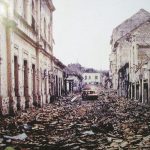ZAGREB, December 18, 2018 – During a session of the Vukovar Town Council on Tuesday, a representative of the Democratic Serb Party (DSS), Borislav Nikolić, asked Mayor Ivan Penava about a possibility to raise a monument to Serb victims in Vukovar, and Penava replied that he would have nothing against such an idea, provided that the DSS admitted that Croatia’s Homeland War was a consequence of aggression which the protagonists of the Great Serbia policy launched against Croatia.
During the session, Nikolić wondered about the reaction to a possible initiative of the Serb NGO called “Protiv Zaborava” (Against Oblivion) that a monument be erected in Vukovar to local Serb civilian victims.
Penava said that he would have nothing against that if the DSS party was ready to acknowledge that the war of independence was a consequence of the Great Serbia aggression.
After the council’s heated debate on that issue involving DSS leader Srđan Milaković, who said that he believed that the 1995 Operation Storm was ethnic cleansing, Mayor Penava told a news conference that Milaković was actually manipulating the public and showing disrespect for history and the Croatian Constitution as well as for judgements of the International Criminal Tribunal for the former Yugoslavia (ICTY) that “expose the Great Serbian regime led by Slobodan Milošević.”
Penava recalled that the relevant verdicts of that UN tribunal also rejected the thesis about Operation Storm as a criminal enterprise.
“Milaković is implementing the Great Serbia programme also known in public as SANU’s memorandum 2,” Penava said, alluding to the continuation of a policy based on ideas promoted in a document known as the SANU memorandum.
The first memorandum of Serbian Academy of Arts and Sciences (SANU), drawn up by a group of Serbian academicians in the 1980s, is perceived in the public as a document that lay the ground for inciting Serb nationalism and the tenets of Milošević’s Great Serbia policy.
Penava went on to say that Milaković falsified history by claiming that “the alleged killings of Serb civilians” paved the way for the wars in the 1990s. The Vukovar mayor said that he had asked Milaković to give him the names of such victims.
The mayor said Serb civilian victims had been a result of the aggression to which Vukovar had been exposed and shelling by the Yugoslav People’s Army (JNA). “Milaković seems to forget the well-known plans of the JNA in the mid-1980s, the delivery of arms to Serb extremists, road blockades, the massacre in Borovo Selo on 2 May 1991,” said Penava.
“We in Vukovar will, of course, call on all citizens who love this country to be with us, who defend the right of each Serb who has decided with their families to live and work here and help develop this city and society.”
“We won’t let the defeated forces from the past whom Milaković is obviously promoting to strike against the foundations of this country,” Penava said.
He also called on the DSS to show publicly its platform and on its officials to say publicly what they think about the developments in Vukovar and about Serb victims who died in the shelling by the JNA and Serb rebels.
Milaković, who is Vukovar’s deputy mayor from the Serb electorate, said at a news conference that a half of the overall Serb population in Croatia used to live in the area where Operation Storm was conducted in August 1995. “Operation Storm could be described in various ways, including ethnic cleansing,” he said, adding that 200,000 Serbs who left that area did not do so voluntarily.
Operation Storm was launched at 5am on August 4, 1995 and within the next 84 hours 10,400 square kilometres or 18.4 per cent of Croatia’s territory, which used to be under control of Serb rebels since 1991, was liberated.
Operation Storm marked the end of the war in Croatia, created conditions for the peaceful reintegration of the eastern Danube River region, spared the north-western Bosnian town of Bihać the fate of Srebrenica, and enabled the return of refugees and displaced persons.
The legitimacy of Operation Storm has been proved before the International Criminal Tribunal for the former Yugoslavia in The Hague. On November 16, 2012, the Appeals Chamber reversed the Trial Chamber’s convictions of General Ante Gotovina, commander of the Split Military District, and General Mladen Markač, special police commander, and ordered their immediate release. The generals were in the ICTY’s custody on charges of involvement in a joint criminal enterprise and excessive shelling of Knin, Gračac, Obrovac and Benkovac.
More news on Vukovar can be found in our Politics section.








